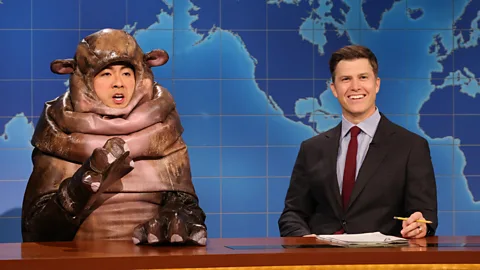 Getty Images
Getty ImagesNew film Saturday Night celebrates the legendary comedy show’s origins – but last weekend’s poor new season premiere confirmed it’s on rockier ground than ever. What went wrong?
Saturday Night Live has achieved legendary status – not a good thing for what is still meant to be a living, breathing comedy show. That is clear from the back-to-back premieres last weekend of a movie about the series’ beginnings, and the new season of the show itself. Jason Reitman’s film, Saturday Night, a loving but flimsy fictional account of the 90 minutes leading up to the first episode in 1975, was released on Friday. The next night you could have zoomed ahead almost half a century to watch the tepid, half-hearted 50th season premiere of SNL. Both suggest how much the myth of the show has overtaken its reality.
SNL has earned its stature, of course. It transformed television comedy and has penetrated American culture. In 2004, Rachel Dratch started playing Debbie Downer, who saw the bleak side of everything. The term “Debbie Downer” is now simply shorthand for a wet blanket. And even a short list of the comic actors the show has produced is astonishing, from Bill Murray and Eddie Murphy through to Will Ferrell and Tina Fey, as well as the talk-show hosts Jimmy Fallon and Seth Meyers.
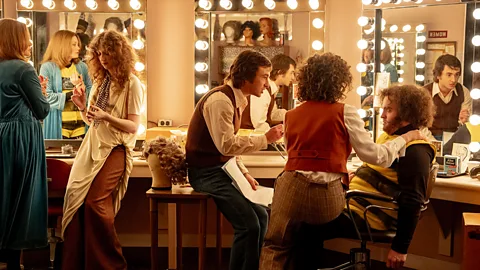 Sony Pictures
Sony PicturesReitman’s film goes back before all that, with the SNL writer Rosie Shuster (Rachel Sennott) trying to describe the show to a befuddled NBC network executive. “It’s postmodern, it’s Warhol,” she says of sketches that include a deadpan Andy Kaufman (Nicholas Braun) lip-synching to a recording of the theme from the children’s cartoon Mighty Mouse. The humour was postmodern bordering on performance art, at least part of the time, and a radical change from the creaky musical variety shows that flooded television then. But the avant-garde inevitably becomes the establishment, and over the decades SNL has turned into the kind of show people complain is bad but watch anyway, from habit as much as anything else.
The loss of its cutting edge
Perhaps because it is so ingrained in popular culture, it still has some currency – but in the age of social media, SNL seems to respond to the culture instead of being on the cutting, forward-facing edge. When Kamala Harris announced that Tim Walz would be her running mate, social media exploded with speculation about who might play him on SNL. People had wish lists of possibilities, living and dead (comedy director Paul Feig wished it could have been Chris Farley). Near-lookalike Jim Gaffigan was among the most plausible, so it wasn’t a huge surprise when he turned up on Saturday in the opening sketch about contrasting Harris and Trump rallies.
That opening sketch was the highlight of the premiere before its long downward slide. Gaffigan’s brief appearance did little more than echo the Walz dad-joke memes that have been online for months. Maya Rudolph was brilliant as a likeable Kamala Harris, a part she has played before. She captures the dancing, the laugh and the steeliness behind the buoyant energy of the “fun aunt”, as the fictional Harris calls herself. But the comic gem was the surprise appearance of Andy Samberg as “second gentlemensch” Doug Emhoff. He entered doing a goofy dance that we haven’t seen the real Emhoff do but we can totally imagine him doing. And Samberg nailed the delivery of every line, especially when enthusiastically talking about how he would embrace the traditional role of first spouse. “I for one can’t wait to decorate the White House at Christmas,” he says. “The theme will be Hanukkah.” That was the kind of sharp, funny, unexpected moment viewers hope for and rarely get.
What’s lost in the fog of the past is that these moments were always rare. SNL is known for its political humour, but for every portrayal that seems so potent it echoes through political reality – Tina Fey’s scathing Sarah Palin impression, chirping, “I can see Russia from my house,” was brutally close to Palin’s own floundering on foreign policy when running for vice-president – there are dozens of toothless caricatures like Alec Baldwin’s purse-lipped Donald Trump, more an impersonation of a cartoon Trump than a satire.
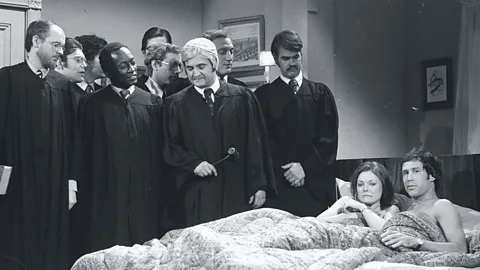 Getty Images
Getty ImagesReitman’s film swallows the SNL myth whole and makes you wonder: who is this movie even for? Reitman grew up loving the show, and if you’re already rabidly interested and familiar with the original cast, Saturday Night might work as homage. For anyone else, it doesn’t do much to fill in the outlines. The premise is that there is chaos backstage. Lorne Michaels (Gabriel LaBelle), the show’s nervous creator, grapples with some drug-fuelled cast members and puts out fires that include an actual fire when lights fall onto a couch. But the film is never as galvanising as it means to be, despite all the hyperactivity behind the scenes, along with fast-paced editing, visual flourishes that include the camera racing through the corridors of the studio and the unexplained presence of a llama.
The cast simply plays into the baked-in images of the originals. John Belushi (Matt Wood) is a difficult genius who refuses to sign his contract. Chevy Chase (Cory Michael Smith) is an egotist. Gilda Radner (Ella Hunt) is sweet with a gentle wit. Jane Curtin (Kim Matula) feels underused, as women often were on the show. Dylan O’Brien captures the essence of Dan Aykroyd’s comic performances and often smarmy characters. Writers pitch a sketch about Julia Child cutting herself while presenting her cooking show and comedically spurting blood. That sketch, with Aykroyd as Child, is a classic that turned up on a later episode. If you don’t know details like that, good luck caring about the movie.
The best aspect of Saturday Night, its generational conflict, is underdeveloped. In brief appearances, Willem Dafoe plays Dave Tebet as a hilariously slippery old-time network executive. JK Simmons is effectively icky as the leering comedian and entertainer Milton Berle who, unfathomable though it seems now, was once one of the biggest stars on television. On a neighbouring stage, his corny song and dance number with chorus girls in spangly costumes suggests just how revolutionary SNL was. But mostly Reitman asks us to assume, or has someone tell us, that its comedy was radical.
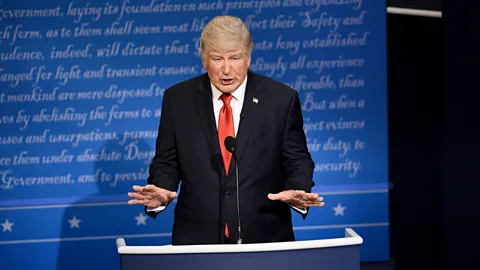 Getty Images
Getty ImagesLamorne Morris has one of the few moments that leaps off the screen. He plays Garrett Morris (no relation), the only black member of the original cast, who feels like an outsider. In a particularly memorable scene from the film, Morris grabs a microphone and sings a controversially bold song for a roomful of white television executives – a song featured in a sketch in a later episode of the show. It’s still jaw-dropping and funny. And it’s hard to imagine today’s SNL being that risky.
A new nadir
SNL was always more uneven than the myth suggests. Watch the real first episode now and it is, shockingly, not all that funny. Even the famous Bee Hospital sketch, with Belushi and others dressed as dad bees in a hospital waiting for news of their little bees’ births, seems like it’s straining to be absurdist. But given that the show is entering its high-profile 50th season, last weekend’s live premiere was unusually rocky. Even its guest host Jean Smart, the beloved star who just won an Emmy for her HBO comedy Hacks, couldn’t save it. There was a tired game show parody, a fake commercial about a Halloween store and a parody about casting I Love Lucy with Smart as a dramatic actress in the Lucille Ball role. More than one review summed it all up as disappointing.
That unevenness may not matter much, since fewer people watch whole network shows the way they did when SNL began. Today, breakout sketches – Ryan Gosling and Mikey Day as Beavis and Butt-Head or Bowen Yang as the iceberg from the Titanic and last weekend as the thirsty baby hippo Moo Deng bemoaning the cost of her fame and comparing it to Chappell Roan’s – go viral, and clips are like gold. According to The Hollywood Reporter, the last season of SNL earned an astonishing 3.1 billion views on social media. That may be the main way the show has kept up with the moment.
Far from being timely, though, in recent years it has often made headlines for controversial hosts whose selection suggests nothing more than pandering for ratings and influence with powerful people. Trump hosted in 2015 while he was running for president, drawing protests from Hispanic and immigration-rights groups outside the studio. Elon Musk hosted in 2021, and while there are a lot of elements to Musk’s reputation, funny guy is not one of them.
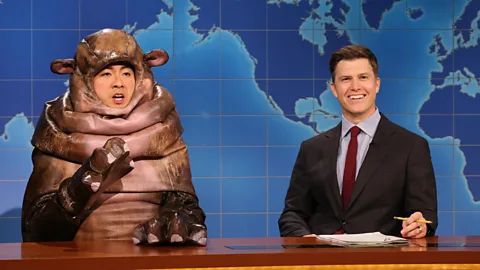 Getty Images
Getty ImagesNBC is celebrating the show’s 50th season with a three-hour prime-time special in February. There’s no need to wait for that to see that SNL has become more iconic than relevant. Maybe it needs more fun aunt. Or as one classic sketch put it, “More cowbell!” More something.
Saturday Night is out now in US cinemas



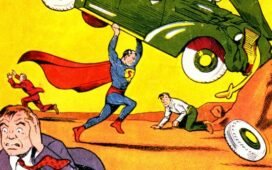




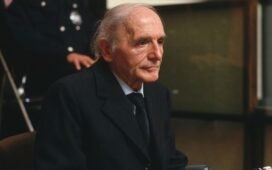
Recent Comments